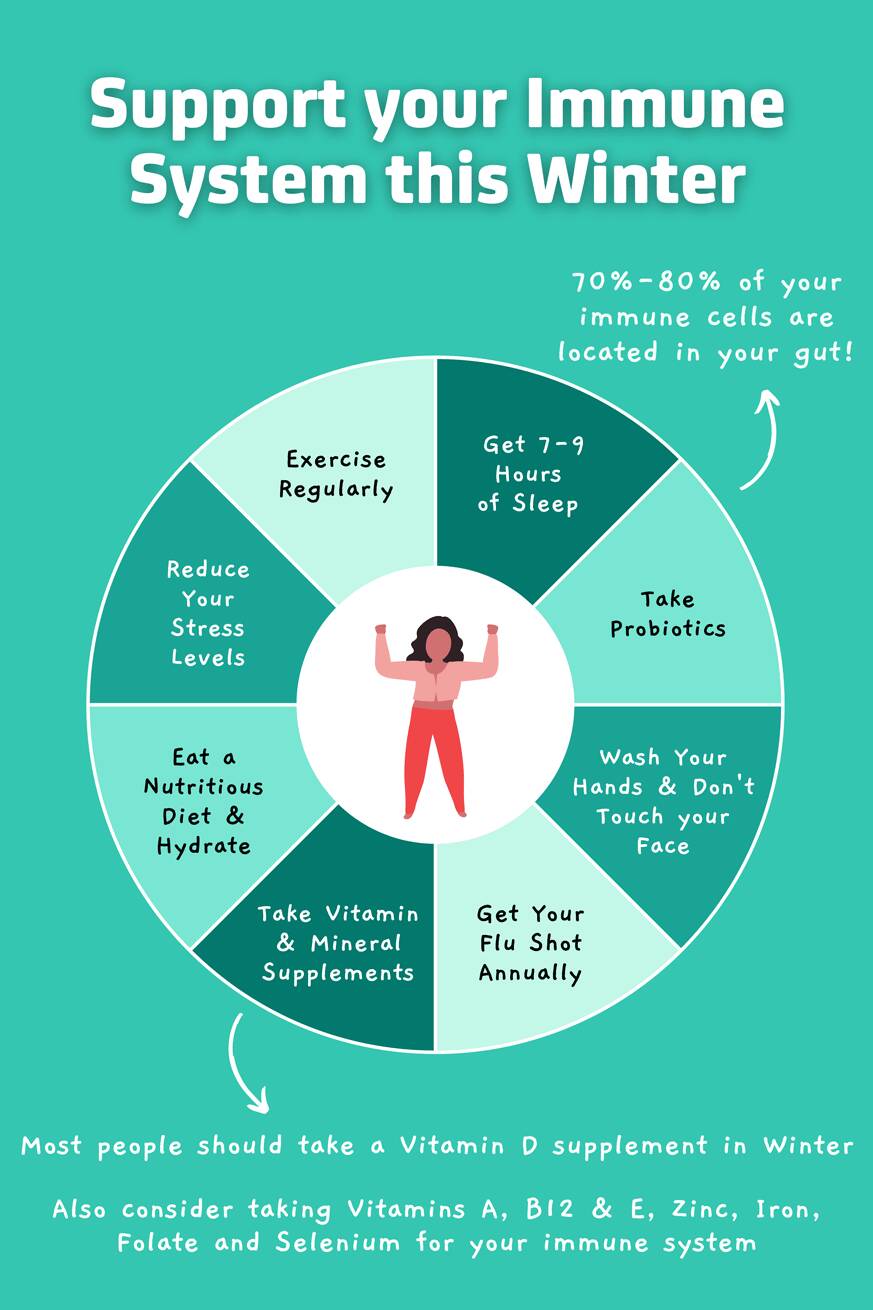
What does the immune system do?
The immune system is the body’s way of defending itself against potentially harmful foreign microbes and fighting infection. Specialised cells in the body are able to recognise invading cells and trigger an immune response to attack these invaders, preventing long term damage. Even the most mild infection could become life-threatening without this response from our immune systems. By keeping a record of every microbe that the body has encountered (thanks to B- and T-lymphocytes), our immune system can respond quickly and effectively to any microbes encountered a second time before they make you ill. However some infections, like the common cold or the flu, have many strains and mutations wso have to be fought many times, as immunity against one virus does not give you immunity against the others.
Support Your Immune System in Winter
Winter can be a hotbed of flu and cold viruses, as temperatures fall and the days get shorter. These viruses can spread better in colder weather, and when we close our windows and stay inside longer to stay warm we are more likely to breathe in the same air as someone carrying a virus. It’s therefore vital to keep your immune system fully equipped for fighting infection when your body encounters it. Immune system health is closely linked to your general health, so many of these tips will not only help both your body’s ability to fight infection but also improve or maintain many other aspects of your health:
Exercise Regularly
Physical activity plays a starring role in preventing illness and keeping you healthy. Frequent exercise increases blood flow, reduces inflammation and stress, and can help strengthen antibodies. The NHS recommends a minimum of 150 minutes of moderate exercise per week, or 75 minutes of vigorous exercise. [1]
Get 7-9 Hours of Sleep
Alongside diet and exercise, sleep is one the 3 cornerstones of health. The National Sleep Foundation advises that adults should get an optimum of between 7 and 9 hours of sleep each night. [2] Even a small reduction in your sleep length/quality has shown to impair immune system functioning.
Eat a Nutritious Diet and Stay Hydrated
There are several essential vitamins and minerals that we require in order for our bodies to function in an optimal way. All of these can either be found in foods we should include in our diet and synthesised in the body. The key is to eat a varied, balanced diet containing proteins, carbohydrates, fats, fibre, and vitamins and minerals (many are found in fruit and vegetables). Doing this will support your immune system and the overall health of your body. Staying hydrated is also essential for your immune system, for transporting nutrients to cells, and for the normal functioning of your organs.
Take Vitamin and Mineral Supplements
Whilst all the vitamins and minerals that we need to be healthy are obtainable from our food sources, in some cases it is difficult to get the required amounts from our diet alone. For example, we predominantly get Vitamin D (key to immune system functioning) from the sun, and in the UK it is difficult to get enough sunlight in the winter months. Most children and adults should therefore take a vitamin D supplement, especially from November to March. Those with darker skin do not absorb as much UV radiation and so have a more difficult time getting vitamin D from the sun, so may need to take supplements all year round. Taking a multivitamin, such as OneVit Complete, is a sure-fire way to be topped up on all your essential micronutrients, in addition to trying to eat a nutritionally balanced diet.
Reduce Your Stress Levels
Small amounts of stress are not unhealthy, but prolonged or very frequent stressful episodes can impede the function of the antibody response in your body. Working to reduce daily stressors with techniques such as mindfulness may help to reduce the impact of the stress and maintain healthy immune system functioning.
Take Probiotics
Probiotics such as the Nutri Within Bio Cultures Complex are live bacteria and yeasts that aid in restoring the good bacteria in the gut. Since between 70% and 80% of your body’s immune cells can be found in your gut, taking care of the delicate balance of these good bacterias should be a priority for anyone looking to bolster their immune system.
Wash Your Hands Regularly and Try Not to Touch Your Face
People frequently touch their eyes, nose and mouth without necessarily realising it, and these are areas that harmful bacteria can enter the body. Whilst we can wear face masks to reduce the chance of breathing in airborne virus particles, the more particle-dense states of solids and liquids have the potential to transfer a greater number of harmful foreign cells more quickly. Try as much as possible to limit how much you touch your face during the day, but as touching the face is often an unconscious act, it’s important to regularly wash your hands with antibacterial soap, and use antibacterial hand gel when out and about (especially on public transport!).
Get Your Flu Shot Annually
Each year, a new flu vaccine is created to tackle the strains of flu virus that scientists believe will be most prevalent that year. It’s created by examining how different strains are developing and spreading in other parts of the world, and although it can’t account for new strains that circulate after it’s creation, it’s advantageous to your immune health and should ideally be received each year, especially if you’re of old age or have immunodeficiencies.
If you are suffering from the flu virus, you may wish to take Tamiflu, an antiviral medication containing oseltamivir. This active ingredient inhibits the formation of an enzyme neuraminidase, which the flu virus needs to spread in the airways, therefore reducing the influenza virus growth.